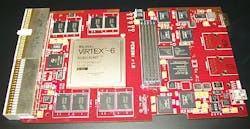NASA chooses 3U CompactPCI FPGA board from 4DSP for high-performance space computing
HAMPTON, Va., 28 June 2013. Computer scientists at the U.S. National Aeronautics and Space Administration (NASA) needed 3U CompactPCI single-board computers for an embedded computing test bed for advanced space instruments. They found their solution from 4DSP LLC in Reno, Nev.
Officials of the NASA Langley Research Center in Hampton, Va., are awarding a $42,479 contract to 4DSP for to provide 3U CompactPCI cards with on-board Virtex-6 LX240T-2 field-programmable gate arrays (FPGAs) to support the NASA High-Speed On-Board Data Processing for Science Instruments (HOPS) project.
The HOPS program seeks to advance the state-of-the-art in high performance on-board data processing to meet anticipated demand in data rate, size, and processing speed of advanced science instruments. The project involves a hybrid modular architecture that supports general-purpose serial processing and a reconfigurable fabric that can support high-speed parallel computation.
The project involves a high-speed interconnection fabric, as well as computationally expensive multi-dimensional science algorithms to drive the design and validate the final architecture. NASA researchers are using advanced electronics potentially applicable to spaceflight to reduce mass and power while improving performance for a broad class of future science missions.
4DSP builds the FC6301 3U CompactPCI card with onboard Virtex-6 FPGA from Xilinx Inc. in San Jose, Calif. The card is for advanced digital signal processing in programmable implementations of complex FPGA algorithms for DSP applications, company officials say.
The FC6301 offers various direct on-board interface options that are closely coupled to large, fast on-board memory resources of the Xilinx Virtex-6 FPGA.
The current NASA contract to 4DSP is for three computer boards. NASA bought these exact devices through previous competitive procurements, and need identical boards to maintain compatibility with existing equipment, NASA officials say.
For more information contact 4DSP online at www.4dsp.com, or the NASA Langley Research Center at www.nasa.gov/centers/langley.
